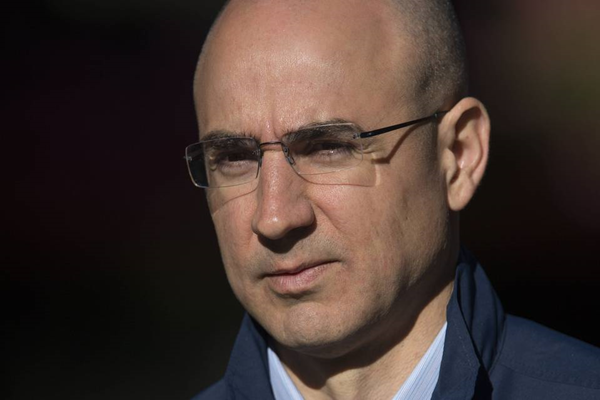|
THE
WALL STREET JOURNAL.
Markets
Don’t Make Me Do This: Rise of the Reluctant Activist
Some typically passive investors are adopting the tactics of
activists
|

Daniel O’Keefe’s investment firm Artisan Partners earlier this
month publicly urged Johnson & Johnson to separate its three
main businesses. Above, Mr. O'Keefe attended a conference in Sun
Valley, Idaho, in 2013. PHOTO: BLOOMBERG |
By
David Benoit
Updated Feb. 18, 2016 7:41
p.m. ET
Investor Jeffrey Osher
sat on his holdings in prepaid-debit-card issuer
Green Dot Corp.
for three years before he lost his patience.
In December, after a
string of disappointing earnings reports that left the company’s
shares down sharply, the hedge-fund manager met with the board and
asked directors to fire founder and Chief Executive Steven Streit,
according to people familiar with the meeting. When the board refused,
Mr. Osher’s Harvest Capital Strategies LLC did something it had never
done before: It publicly threatened to run a campaign to oust the
company’s directors.
Those moves put Mr.
Osher into a newly emerging class of shareholders: Typically passive
investors who are adopting, sometimes reluctantly,
the tactics of activists.
The rise of these
“reluctavists” or “suggestivists,” as they are sometimes called,
reflects the success of vocal shareholders in forcing corporate
change, as well as broader shifts in the investing world. Changes in
securities laws and an expansion of investor rights have encouraged
shareholders who once deferred to management to speak up when they are
unhappy.
First-time activists ran
49 campaigns against U.S. companies last year, up from 36 in 2014 and
15 in 2011, according to Activist Insight. Some 54% of all campaigns
were launched by what the researcher deems “occasional” activists, up
from 30% in 2011.
Two longtime airline
shareholders recently changed their status to active investors from
passive at
United Continental Holdings
Inc.,
the parent of United Airlines, indicating they plan to raise their
voices on strategy and management. Canyon Capital Advisors LLC has
joined
a chorus of activists pushing
Yahoo Inc.
to
change direction, a rare move for the $24 billion fund.
| |

Harry Wilson last year led several large investors in a
successful push to get General Motors Co. to buy back more
shares.
Photo: Michael Nagle/Bloomberg News
|
Harry Wilson, an
architect of the Obama administration’s restructuring of
General Motors Co., last year
led several large investors in a successful
push to get GM to buy back more shares.
Angie’s List Inc.,
meanwhile, is facing a possible fight for board seats after resisting
a sale backed by TCS Capital Management LLC, an investor that first
took a stake in the consumer-review website before its 2011 initial
public offering.
“These are long-term
investors who have reached a point where they see opportunities for
value that the company isn’t pursuing and after years of
underperformance they are putting themselves out there,” said Andrew
Freedman of law firm Olshan Frome Wolosky LLP, which represents
activist investors, including some first-timers. “They aren’t just
short-term value seekers. They are the long-suffering shareholder.”
Whether this new crop of
investors will find the same success as dedicated activists remains to
be seen. While there are notable exceptions, such as
John Paulson’s Paulson & Co.,
most occasional activists lack the name recognition and track record
of established activists like
Carl Icahn or
William Ackman.
Furthermore, these
investors often have smaller stakes in the companies they target.
Daniel O’Keefe’s $32
billion investment firm Artisan Partners earlier this month publicly
urged
Johnson & Johnson
to
separate its three main businesses. Artisan has a 0.2% stake in the
health-care company, which has a market value of $284 billion.
‘Like most people, I don’t
welcome battles.’
—George Young, chief compliance officer at Villere
|
|
J&J has met with Mr.
O’Keefe several times, but it is standing by its corporate structure.
“These are not decisions
that I came to on a whim,” Mr. O’Keefe said. “These are conclusions
that I came to after years of following the company and considering
counterpoints.”
Funds wading into
activism for the first time say the experience can be eye-opening.
Take St. Denis J.
Villere & Co., a 105-year-old New Orleans investment firm whose first
foray into activism landed it in court. The family-run firm in 2014
raised concerns about legal-software company
Epiq Systems Inc.
after 11 years of investing in the stock. The two sides later reached
an agreement to put a Villere ally on the board as Epiq launched a
strategic review.
But a year later, that
process had stalled, and Epiq’s results disappointed the investor.
Villere nominated six directors to the company’s nine-member board in
December.
Epiq, while saying it’s
open to shareholder input, said the nominations violated the earlier
settlement. Epiq and Villere have traded lawsuits. The company
recently named a new lead independent director and replaced two board
members.
George Young, Villere’s
chief compliance officer and a member of its founding family, said a
long-running evolution of U.S. securities law has spurred Villere to
think more about how it votes its shares. That, in turn, has led it to
get more aggressive with management teams.
But future public
campaigns are a different story. Mr. Young, who often carpools to work
with his uncles and cousins, said he was unaccustomed to the
round-the-clock demands of an activist fight.
“Like most people, I
don’t welcome battles,” he said.
Mr. Osher said he, too,
would rather operate behind the scenes. But he felt Harvest, one of
Green Dot’s largest shareholders, needed to publicly state its case.
On Jan. 25, the 16-year-old San Francisco investment firm released a
93-page presentation criticizing Green Dot’s performance. It also
directed shareholders to a website, www.fixgdot.com, that urged the
company to immediately remove Mr. Streit.
Green Dot said its board
and management held “numerous” calls and meetings with Harvest and
would “carefully review” the investor’s suggestions.
“I prefer to operate out
of the public eye,” Mr. Osher said. “I’m very disappointed this is the
avenue we had to pursue.”
Write to
David Benoit at
david.benoit@wsj.com
|